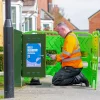UK Government Detail Connection Vouchers to Fix Urban Broadband
The government has today launched a new consultation that reveals how its troubled £150 million “Super-Connected Cities” (Urban Broadband Fund) programme will go about improving business broadband connectivity in selected cities now that EU state aid concerns have forced them to scrap their infrastructure development. But some homes might still benefit.
The UBF originally aimed to help expand the coverage of “ultra-fast” broadband (80-100Mbps+) and “high speed” public wifi services into neglected areas. But the situation changed in early May 2013 after a mix of legal challenges from BT / Virgin Media (here) and competition concerns from the European Commission (EC) forced the government to “urgently find a Plan B” (here).
Advertisement
In essence Europe didn’t like the idea of public money being spent in areas where the private sector is already supposed to find commercially viable for upgrade and warned that any funds would also need to go towards truly open access fibre providers. At the time a statement from INCA said that the government was “worried that this would mean the exit of BT“.
The result was that the UK’s urban broadband scheme would have required a lengthy review by the EC’s competition authority and the outcome might have been a gamble. Instead the government was left to scrap the infrastructure part of this effort and replace it with a controversial Connection Vouchers Scheme, which would help individual businesses to get a better broadband connection and maybe some home workers too.
Some ISPs were understandably concerned that such a scheme would simply end up favouring incumbent operators (e.g. BT) over new infrastructure investors (ISPs) but until now the precise details of this scheme have not been revealed. Today all that changed when the government launched a consultation, which is “seeking views about the objectives, design principles and operation of the scheme from communications providers, SMEs and other participants“.
Ed Vaizey, Communications Minister, said:
“We know the costs associated with getting broadband connections featuring the reliability and speeds that businesses need can be a barrier, especially for smaller businesses. The connection voucher scheme aims to overcome this barrier, by subsidising upfront installation costs for superfast and ultrafast broadband with a primary focus on SMEs.
The voucher will work with the market, will be technology neutral and therefore put the choice of connectivity into the hands of the businesses that can benefit from them. The aim is to provide the step change in connectivity that is needed for the UK to remain competitive in the 21st century digital marketplace. As part of that we are determined that the voucher scheme should generate maximum competition amongst ISPs to provide the connectivity solutions that businesses need.”
The scheme would “initially” be made available to the 10 large cities (here) and 12 smaller cities (here) that have so far secured funding through the UBF to improve their broadband infrastructure. It would enable them to “issue a total of up to £90 million of vouchers to broadband customers“, which are currently defined as being any small or medium sized business of up to 249 employees with a turnover no greater than around £42 million per year (€50m). The fixed line speed target has also been set at 30Mbps like the EU’s central goal.
Advertisement
But the consultation proposes that eligible applicants could also include Small Office/Home Office (SOHO) workers and, in certain circumstances, commercial landlords for multi-SME premises. In fact it might even go a bit further than that and include residential properties. Hmm. Crafty.
Connection Vouchers Statement
“Each City may also choose to extend the scheme to include Social Enterprises, Charities, Doctors Surgeries, Libraries or Leisure Centres, where there is a demonstrable case that this is likely to encourage greater efficiency and/or economic growth.
It is anticipated that some cities may also consider including residents as a secondary focus where there is a demonstrable market failure.”
The scheme will be focused on funding connection costs “where there is evidence that demand exists and that connection charges are a genuine barrier to take-up“. For example, it could be used to cover the install fee of a 330Mbps connection via BT’s FTTP (FTTP-on-Demand) or possibly their FTTC service.
However a question mark remains over which suppliers will be eligible for this and the consultation states, “SMEs will be able to redeem their vouchers against services provided by suppliers who have been previously registered for the Scheme under a “light touch” BDUK process” (e.g. BT and Virgin Media, but this is not to be confused with the rural BDUK fund).
New suppliers can still join but only after they’ve been given “minimal vetting against defined criteria in order to mitigate the risks of potential fraud and ensure that suppliers are capable of delivering services at a retail level to SMEs“.
Advertisement
The Vouchers will also have a defined value, set by each City. Across all the SCCP, there is expected to be a minimum and maximum value, currently anticipated to be between £250 and £3,000. It’s expected that the new consultation will close at 5pm on Wednesday 24th July 2013 and after that a trial of the voucher scheme will be conducted in several of the selected cities this summer to help “inform the final scheme design“.
In semi-separate news it’s been revealed by the BBC that only two of the local councils involved in the wider £530m Broadband Delivery UK (BDUK) scheme have actually received any money from the government and together the figure totals just £3 million. This is despite contracts for more than half of the projects having already been signed, some of which were agreed last autumn.
A spokesman for the government’s related Department for Culture Media and Sport (DCMS) said: “Following procurement, we are at the beginning of the nationwide delivery stage, so it is to be expected that most local authorities are not at the stage where they would have claimed the money allocated to them. Work is underway in sites across the country and we are confident the vast majority of projects will be completed by 2015.”
Mark is a professional technology writer, IT consultant and computer engineer from Dorset (England), he also founded ISPreview in 1999 and enjoys analysing the latest telecoms and broadband developments. Find me on X (Twitter), Mastodon, Facebook, BlueSky, Threads.net and Linkedin.
« BT Confirm UK Superfast Broadband FTTC Vectoring Trial for Late July


















































Comments are closed